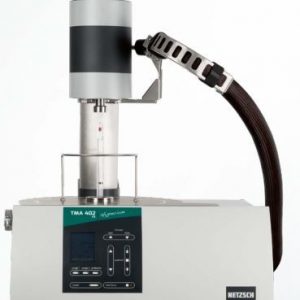Thermomechanical Analysis (TMA)
Thermomechanical analysis (TMA) is a technique for determining the dimensional changes in solids, liquids, or pasty materials as a function of temperature and/or time under a defined mechanical force (DIN 51005, ASTM E 831, ASTM D696, ASTM D3386, ISO 11359 – Parts 1 to 3). It is closely related to dilatometry (DIL) , which determines the length change of samples under negligible load (DIN 51045).
Many materials undergo changes in their thermomechanical properties during heating or cooling. For example, phase changes, sintering steps or softening can occur in addition to thermal expansion. TMA analyses provide valuable insight into the composition, structure, production conditions, and application possibilities for various materials.
The application range of instruments for thermomechanical analysis extends from quality control to research and development. Typical domains include plastics and elastomers, paints and dyes, composite materials, adhesives, films and fibers, ceramics, glass, metals, and composite materials.
Showing all 2 results

